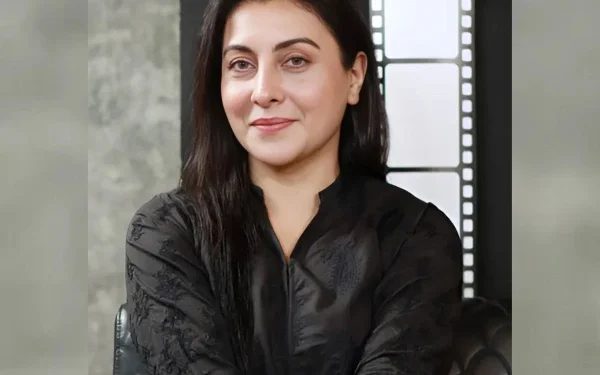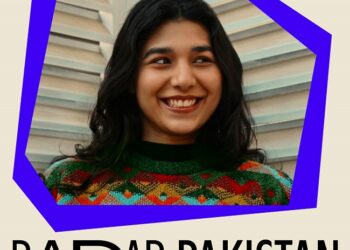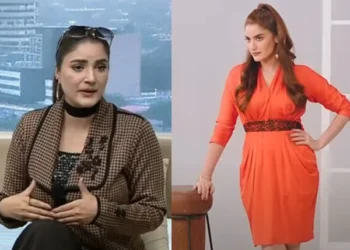In a deeply emotional revelation, renowned Pakistani actress Leila Wasti shared with her fans the most challenging chapter of her life—a life-threatening battle with cancer. Speaking during a private television program, the actress opened up about her painful journey of diagnosis, treatment, and survival.
Leila Wasti, admired for her grace and versatile acting, revealed that during this harrowing time, a miracle in the form of a German bone marrow donor saved her life. Her story not only highlights her strength but also sheds light on the importance of bone marrow donations, global donor networks, and hope for cancer patients.
Who is Leila Wasti?
Leila Wasti is a celebrated television actress in Pakistan, known for her sophisticated performances in dramas such as Qurban, Dil Ruba, Kuch Ankahi, and Dobara. Born into a family with a strong artistic background, she is the daughter of legendary TV actors Tahira Wasti and Syed Rizwan Wasti.
Over the years, she has earned a reputation for taking on dignified and mature roles that resonate with audiences. Beyond acting, Leila Wasti is also admired for her elegant personality and resilience, which became even more evident when she revealed her battle against cancer.
The Shocking Diagnosis
Like many cancer patients, Leila Wasti’s ordeal began with a shocking diagnosis. The actress did not initially disclose the details of her illness to the public, as she was focusing on fighting the disease privately with her family’s support.
During the television program, she revealed that the cancer she faced required a bone marrow transplant, one of the most complex and often last-resort treatments for patients suffering from certain blood cancers and related conditions.
She described this time as one of immense pain, uncertainty, and constant prayers, adding that her faith in Allah gave her the strength to continue.
The Search for a Bone Marrow Donor
Why a Bone Marrow Transplant?
A bone marrow transplant is often the only cure for patients with certain types of leukemia, lymphoma, and other severe blood disorders. In this procedure, unhealthy bone marrow is replaced with healthy stem cells from a compatible donor.
The most difficult part is finding a genetic match. The donor’s tissue type must closely match the patient’s, almost like DNA-level compatibility.
Family Wasn’t a Match
Leila shared that her immediate family members and friends were tested, but none of them matched her genetic profile. This is a heartbreaking reality for many patients, as siblings have only about a 25–30% chance of being suitable donors.
She explained:
“When you are fighting a deadly disease like cancer, the person who saves your life after Allah is the donor. But in my case, no one from my family or close circle matched.”
Waiting in Uncertainty
Patients without a family match often rely on international bone marrow registries, where volunteer donors from across the world are listed. Finding a match can take months or even years, during which patients often undergo chemotherapy repeatedly just to stay alive until a donor is found.
Leila Wasti described this waiting period as one of the most difficult phases of her life, filled with both fear and hope.
The Miracle: 19 Matches Found
In a surprising turn of events, Leila’s search revealed not just one but 19 matching donors—a rarity in bone marrow transplantation. Even more remarkable was the fact that these matches were not found among relatives or friends but among strangers from around the world.
“It was nothing short of a miracle,” she said. “In most cases, patients spend years searching for one match. But Allah blessed me with 19 potential donors.”
This incredible outcome gave her renewed hope and underscored the power of global donor networks, where people who have never met can come forward to save lives.
The German Donor Who Saved Her Life
Among the 19 matches, one donor stood out—a German citizen who agreed to donate his bone marrow. Leila Wasti called this man the person who became the means of her survival after Allah’s will.
The transplant procedure was carried out successfully, and it gave her a second chance at life.
She emphasized the selflessness of the donor, who did not know her personally yet stepped forward to make such a life-altering sacrifice. Bone marrow donation is not a simple act; it requires medical procedures, time, and in many cases, a willingness to endure discomfort to save another person’s life.
Raising Awareness About Bone Marrow Donation
Leila Wasti’s story brings attention to the dire need for bone marrow donors, particularly in Pakistan where awareness is limited and registries are underdeveloped.
Challenges in Pakistan
- Lack of awareness about the process of bone marrow donation.
- Limited donor registries compared to developed countries.
- Cultural and religious misconceptions that discourage people from registering.
How Donation Works
Bone marrow donation is often misunderstood. In most cases, it is a non-surgical procedure where stem cells are collected from the donor’s blood, similar to a blood donation. In fewer cases, it involves taking marrow from the pelvic bone under anesthesia.
The risks are minimal, and the donor fully recovers within weeks. Yet, this simple act can save countless lives.
Faith, Gratitude, and Survival
Throughout her narration, Leila Wasti repeatedly mentioned that her survival was due to Allah’s mercy. She believes her recovery was not only a medical success but also a spiritual journey that deepened her faith.
“When life puts you to the toughest test, it is only Allah’s help that makes you strong. After Allah, it was this German donor who became the reason I am alive today.”
Her story is not just one of survival but also of gratitude, resilience, and renewed hope.
Life After Recovery
After undergoing the transplant and recovery process, Leila Wasti returned to acting, continuing to mesmerize audiences with her performances. She is now seen not only as a talented actress but also as a symbol of strength and inspiration.
Her decision to openly share her cancer journey is helping reduce stigma around the disease, encouraging patients to seek timely treatment, and inspiring others to consider bone marrow donation.
Impact of Her Story
Leila’s revelation has had a powerful impact:
- Inspiring Cancer Patients – Many battling cancer now see her as proof that recovery is possible with faith, treatment, and support.
- Encouraging Donors – Her acknowledgment of the German donor highlights how a stranger’s generosity can save a life, encouraging more people to register.
- Awareness in Pakistan – The story sparks much-needed conversations about expanding bone marrow donor registries in the country.
Conclusion
The story of Leila Wasti’s survival against cancer is nothing short of extraordinary. From the pain of diagnosis and the hopelessness of failed family matches to the miracle of finding 19 donors and finally receiving life-saving bone marrow from a German stranger, her journey embodies resilience, faith, and humanity.
Her courage in sharing this personal battle reminds us that cancer is not the end—it can be fought and survived with timely medical care, international cooperation, and the kindness of people willing to donate.
As Leila continues to shine on television screens, she also shines as a beacon of hope, proving that miracles do happen and that sometimes, the person who saves your life is someone you have never even met.

























